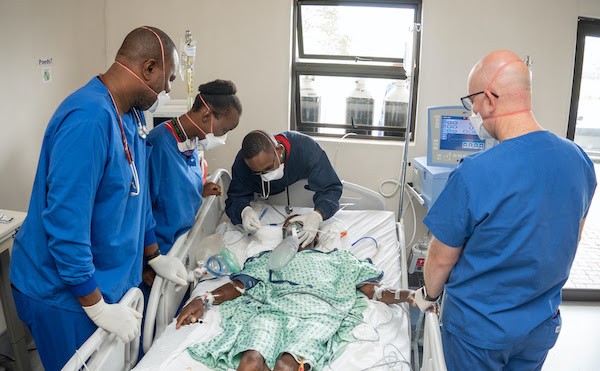


The Luke Commission helps so many people that it’s hard to keep track of who is coming and going from the Miracle Campus. Almost impossible.
That’s what happened to Mandla Kunene, who for many years has led TLC’s construction crew.
A man bitten by a black mamba was being treated by the TLC medical team. He was very ill and needed to be on a ventilator to breathe. Suddenly, Mandla put two and two together and learned the man was his uncle!
“I did not know until I saw Titus, the brother to the man bitten by the snake. Then I realized the patient was the brother to my mom!” he said. “Thanks to The Luke Commission for serving him and being there for my family. Dokotela (Doctor) Harry was with him the whole day. It’s a miracle.”
“You never know when you are treating someone who could be your father, mother, brother, sister, child or grandchild—actually treating a family member,” said Pastor Brian, who watched the scene unfold.

“I was working outside with the construction crew, while Dokotela Harry was working inside to save the life of my uncle,” exclaimed Mandla. “I still don’t believe it.” (Harry will be the first to say that it was a team effort. Still…)
Mandla’s uncle Sitatata is a security guard at a rural Eswatini school. He accidentally slashed a black mamba with his bush knife as he cut down tall grass. The snake then bit him.
The headmistress rushed Sitatata to the nearest health center. By the time he arrived, he could no longer walk.
Thea, a snake bite expert who works closely with TLC, explained that the black mamba’s venom is neurotoxic, meaning it attacks the central nervous system, making the victim unable to use his muscles.
“At the health center, they didn’t have antivenom or a ventilator, so he was rushed to The Luke Commission’s Miracle Campus,” Thea reported.
“On the way there, he developed full ptosis, as well as typical black mamba symptoms: salivating, severe perspiration, fasciculation, and weakness as the paralysis started to set in.”
Thea continued, “Despite receiving antivenom as soon as he arrived at TLC, his condition worsened. It became a monumental battle to stabilize him, but fortunately he had an excellent medical team who refused to give up. For a few hours, we did not know if he would make it. Then it was a case of wait and see.”

Thea remembered “a tiny man, lying totally paralyzed by the black mamba venom, relying on a ventilator to breathe for him, and a team that never left him alone for a second.”
Then, as Mandla witnessed and Thea explained: “Because Sitatata received sufficient antivenom and exceptional care, just shy of 48 hours he began to recover. First he started moving his fingers and hands, then his legs, and finally it was time to see if he could manage breath without assistance.”
Sitatata was weaned off the ventilator and started to breathe by himself.
His first words were, “Thank you, Jesus. Thank you, Jesus.” He pumped the air in victory. Soon, he was sitting up, talking, singing, and even eating a banana.
“The reason Sitatata is alive today,” said Thea, “is because everyone worked as a team. The SOS went out immediately, and everyone responded without delay. This is the only way we are going to reduce the suffering from snake bites, not only in Eswatini but in the rest of Africa.”
Meanwhile, Mandla is relieved and thankful that The Luke Commission, “my team,” was close by and prepared when his family member needed help!
JT for that team
PS More than 20 patients who have been bitten by poisonous snakes have been admitted to TLC’s Miracle Campus in the past month. TLC’s under-construction oxygen production plant will provide a stable supply of life-oxygen to patients like Sitatata. Learn more at lukecommission.org/oxyge

Emergency Numbers can be found under the Contact menu tab.

